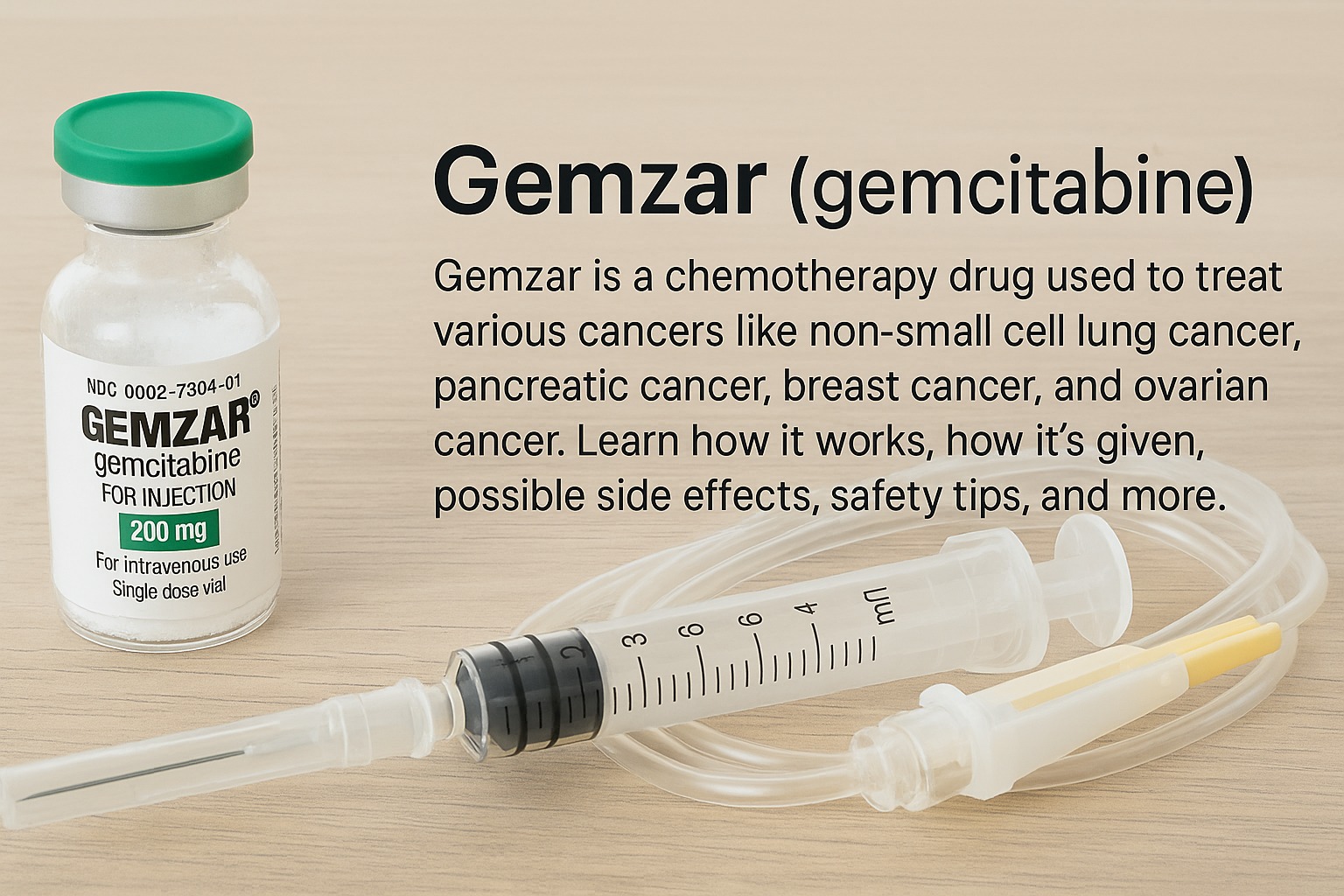Gemzar is a prescription chemotherapy medicine used to treat different types of cancer. Its active ingredient, gemcitabine, is an antimetabolite that works by slowing or stopping the growth of cancer cells. Doctors use Gemzar alone or in combination with other drugs to manage cancers such as lung, pancreatic, breast, bladder, and ovarian cancer. Treatment is given by IV infusion in a clinic under the supervision of your oncology team.
In this clear and patient-friendly guide, you’ll learn what Gemzar is, how it works, when doctors prescribe it, how treatment is given, possible side effects, safety precautions, and answers to some of the most common patient questions.
Disclaimer: This article is for educational purposes only and should not replace professional medical advice. Always follow your doctor’s instructions regarding treatment.
What Is Gemzar?
Gemzar is the brand name for gemcitabine, a chemotherapy drug classified as an antimetabolite. Antimetabolites interfere with DNA and RNA production, which cancer cells need to grow and divide. By disrupting these processes, Gemzar helps shrink tumors and slow disease progression.
Gemzar is supplied as a powder for solution, which is mixed and infused into your vein in a hospital or infusion center.
How Does Gemzar Work?
Gemzar works by blocking the ability of cancer cells to make DNA and RNA, which prevents them from dividing. While it primarily targets rapidly growing cancer cells, it may also affect some healthy cells, which explains certain side effects like low blood counts and fatigue.
Common Uses of Gemzar
Doctors prescribe Gemzar for several cancers, often in combination with other chemotherapy agents:
- Non-small cell lung cancer (NSCLC): Alone or with cisplatin.
- Pancreatic cancer: As a single-agent treatment.
- Breast cancer: With paclitaxel for advanced cases after previous treatment.
- Ovarian cancer: With carboplatin for recurrent disease.
- Bladder cancer: With cisplatin for locally advanced or metastatic cases.
Your oncologist will tailor the regimen depending on your diagnosis and treatment history.
Gemzar Dosage and Administration
Gemzar is given by intravenous (IV) infusion, usually over 30 minutes. Dosage depends on your cancer type, body surface area, blood counts, and other treatments you are receiving.
Typical examples include:
- Lung cancer: Gemzar on days 1 and 8 of a 21-day cycle (often with cisplatin).
- Pancreatic cancer: Weekly for several weeks, then a rest week.
- Breast, ovarian, and bladder cancer: Often combined with other chemotherapy on set cycles.
Before each infusion, blood tests are checked to ensure your white cells, red cells, and platelets are safe enough for treatment.
Side Effects of Gemzar
Like most chemotherapy drugs, Gemzar can cause side effects. Not everyone experiences all of them, and many are manageable with supportive care.
Common side effects:
- Fatigue
- Nausea and vomiting
- Low blood counts (increasing risk of infection, anemia, or bleeding)
- Fever and flu-like symptoms
- Swelling in hands or feet
- Hair thinning
- Rash
Serious side effects (call your doctor right away):
- Shortness of breath or chest pain
- Severe or persistent fever
- Easy bruising or unusual bleeding
- Yellowing of skin/eyes (possible liver issues)
- Severe fatigue or confusion
Your healthcare team will monitor you closely and may adjust your dose if needed.
Warnings and Precautions
- Infections: With low white blood cells, even a mild fever should be reported immediately.
- Pregnancy and breastfeeding: Gemzar can harm an unborn baby. Effective contraception is required during treatment and for a period after the last dose.
- Kidney and liver function: Regular monitoring is needed, as Gemzar may affect these organs.
- Vaccines: Live vaccines should be avoided during chemotherapy.
Drug Interactions
Gemzar is often combined with other chemotherapy agents such as cisplatin, carboplatin, or paclitaxel. Your doctor will review all prescription drugs, supplements, and herbal products to avoid harmful interactions.
Gemzar vs. Other Chemotherapies
Gemzar is valued for its effectiveness and relatively manageable side-effect profile compared to some older chemotherapy drugs. It is often chosen as part of a combination regimen, especially in bladder, ovarian, and lung cancers.
Frequently Asked Questions (FAQs)
Q1. How is Gemzar given?
Gemzar is given by IV infusion in a hospital or clinic, usually over 30 minutes.
Q2. How long will I need Gemzar treatment?
Treatment continues in cycles until the cancer stops responding, side effects become too severe, or your doctor recommends a change.
Q3. Will I lose my hair on Gemzar?
Hair loss can occur but is often mild compared to some other chemotherapy drugs.
Q4. Can Gemzar be taken at home?
No. Gemzar must be infused in a medical facility under professional supervision.
Q5. How do I manage Gemzar side effects?
Rest, good nutrition, and reporting symptoms early can help. Your team may prescribe medications for nausea, anemia, or infections.
Final Thoughts
Gemzar (gemcitabine) remains an important chemotherapy option for several cancers, used alone or in combination with other drugs. While side effects are possible, many patients benefit from its ability to slow disease progression and improve quality of life. Success depends on close monitoring, following your doctor’s instructions, and communicating openly about how you feel during treatment.


Leave a Comment